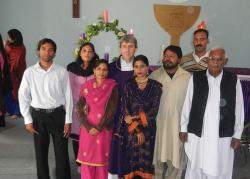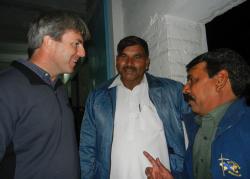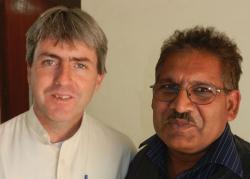Columban Fr Liam O’Callaghan has spent many years working in Pakistan. In his Christmas 2016 letter, he looks back over the events of that year.
 Greetings to you from the ‘land of the pure’ which is the meaning of the word Pakistan. It is hard to believe that another year is almost over. I would like to share with you some of this year’s happenings for me.
Greetings to you from the ‘land of the pure’ which is the meaning of the word Pakistan. It is hard to believe that another year is almost over. I would like to share with you some of this year’s happenings for me.
In January, I moved from Lahore to Hyderabad which is almost a 1,000km journey to the south of the country. After over 15 years in Lahore it was a big change for me as the provinces of Punjab and Sindh are quite different. Because of our falling numbers, now only five Columbans in Pakistan (four Irish and one from New Zealand), we decided to concentrate in one area and so left Lahore after 35 years of ministry there. We will all be now based in Hyderabad diocese, where the Columbans have been working with the Parkari Kholi tribal group since 1983.
I am living in the parish house of the Cathedral parish in Hyderabad City and am involved in a number of different works. Bishop Samson Shukardin appointed me Coordinator of the Ecology Commission of the diocese and I have been busy working on the translation into Urdu of a shortened version of Pope Francis’s encyclical on the environment, Laudato Si’, 'On Care For Our Common Home'. I have also been visiting many parishes and schools giving seminars on this topic and trying to create groups who will work on this issue. I am convinced that climate change and its effects is the biggest issue facing Pakistan today. The problem of unsafe drinking water is chronic. Surveys reveal that 80% of all illnesses in the country and 40% of all deaths result from it. We are looking into and researching different types of water filters, especially those that are affordable to the poor.
Another area of focus for me is Interreligious Dialogue (IRD) and one of the ways I am trying to work this out is by working on the above issues with Muslim and Hindu individuals and groups, involved in these issues too. By working together on such issues for the common good, automatically peoples of different faiths are coming closer together and can help to dispel the misunderstandings which often are present. Working together on campaigns, social and political lobbying, trying to get the government and political leaders to provide clean water, working to mitigate the effects of climate change. are some of the areas we will be focusing on together. The Columban IRD website, www.columbanird.org is proving helpful in enabling people to engage with those of different faiths or none, in our increasingly multi-religious, multi-cultural world.
Please feel free to share this website with anyone you think might use it or benefit from it.
Life in Pakistan continues to be a struggle for the majority of its estimated 200 million people. The biggest struggle by far is the ever growing extremism and ongoing violence. Provisional figures released show that so far in 2016 over 1,300 people have died in violent attacks, 732 ‘militants’ killed in attacks by security forces, 423 civilians and 177 security force personnel. Suicide bombs and attacks occur at alarming regularity, some of the worst being the Easter Sunday suicide bomb attack at a park in Lahore, where 75 were killed, including many Christians, the Quetta police training centre attack in October where 64 security force personnel were killed and in November 54 people were killed in an attack on a Sufi shrine in Baluchistan.
Economically, Pakistan is struggling and mired in debt. The only hope of economic improvement depends on its economic partnership with China. Pakistan has become central to China’s broader infrastructure push across Eurasia. In 2015, both countries signed the agreement known as the China-Pakistan Economic Corridor (CPEC), in which China will invest $51.5 billion in infrastructure projects, a planned network of roads, railways, fibre optic cables, power plants and gas pipelines. The government of Nawaz Sharif is banking on the CPEC to drag the country out of the economic doldrums, as well as return him to power in the 2018 general election. Twenty one billion dollars of this money is to fund power projects, unfortunately mostly coal plants and one nuclear plant, to increase electricity supply by over 50%. This is a central promise of his election campaign in 2013 and a chronic problem in the country which can have up to 12 hours of power cuts per day in summer. 10,000 Chinese workers are already present here working on many of these projects.
I wish you all the blessings you and your loved ones need at this time and especially pray that the new-born Prince of Peace be a source of good news, love and peace for you this Christmas and throughout the New Year.
Columban Fr Liam O'Callaghan has spent most of his missionary life in Pakistan.
 |
 |
 |
 |